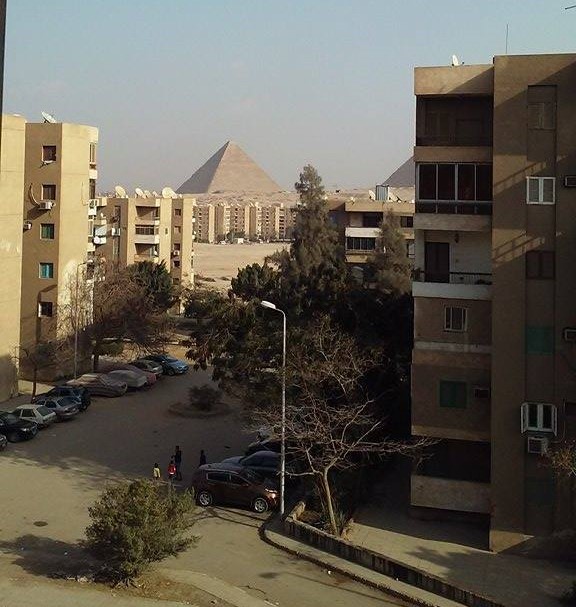From the USA to Egypt: LiveLearnTravel
 I'm Rachel, expat and blogger from LiveLearnTravel.net. My home is East Coast, USA. I've lived in NYC, the state of NJ, and finally Orlando, Florida from where I moved to Cairo, Egypt almost 2 years ago.
I'm Rachel, expat and blogger from LiveLearnTravel.net. My home is East Coast, USA. I've lived in NYC, the state of NJ, and finally Orlando, Florida from where I moved to Cairo, Egypt almost 2 years ago.
1. Why did you move abroad?
Although I'd always dreamed of living abroad one day, I never anticipated it would happen at this point in my life. Nor did I imagine my experience would be living in Egypt.
It started with meeting my husband as part of a language exchange. After becoming good friends online we decided to meet in Egypt. When visiting, I instantly felt comfortable in Egypt and liked it but returned back home with every intention of carrying on my life in the US as normal. However, when my family at home learned of my trip and my relationship with my husband they weren't at all accepting of it.
When you hear stories of people whose families don’t accept their decisions and harm them as a result, you never expect that it could happen to you. But to summarize and without too much detail, the level my family escalated to was unexpected. Feeling it was the best thing to do, my husband agreed that I would move to Cairo to live with him, and here I've been ever since.
2. How do you make a living?
I made a brief attempt at building a career in Egypt and went on many interviews. It was a bizarre experience in contrast to job seeking in the US. Companies here openly discriminate in the recruitment process and it's not uncommon to see job ads that read like this:
Secretary Wanted, must be female, good looking and presentable, under 30 years old. Applications without recent pictures will not be considered.
-or-
Call Center Supervisor Wanted, must be Egyptian, male, between 35-45 years of age and married.
On my first interview here at a multinational company, I was asked how I should expect to be able to work if I was recently married. After all, the interviewer told me, marriage in itself was a full-time job. I didn't know how to tell him that where I'm from marriage doesn't define a woman's entire existence. Ironically, I turned down the offer extended because the hours were kind of late and my husband was worried that it was unsafe for me to be out alone after dark.
After many leads to nowhere, I found a job and worked in downtown Cairo near the Nile. My time there was short. I did not enjoy it. There's no perfect place in the world, but unfortunately, the foundations of fairness and ethical behavior that have been ingrained in me aren't always prioritized or enforced here. The upside is that I learned my way around Cairo somewhat and now know how to use the metro, buses, etc. and can navigate the city somewhat independently.
After over a year of trial and error, I've been fortunate enough to find my happy place working 100% remotely with American businesses in Recruitment, Sales and Marketing. Working remotely has forced me to learn a slew of new skills, made me very "techie", and is one of the most positive ways in which expatriation has impacted my life.
3. How often do you communicate with home and how?
Absence really does make the heart grow fonder. I talk to at least one of my friends or family members in the US every day. Of course, we text and chat over social media, and talk on the phone.
4. What's your favorite thing about being an expat in Egypt?
The best part about being an Expat in Egypt is getting to regularly see and appreciate iconic sites like the Pyramids of Giza, the Red Sea, the Nile, and the City of Alexandria, the latter which I haven't visited yet but would like to.
5. What’s the worst thing about being an expat in Egypt?
Being a Westerner in Egypt, the culture shock hits hard. It's easy to fall into a negative thought pattern about how much more organized things are back home, and constantly wonder why simple things have to be so complicated here. If you like life to be efficient and tidy, you can get frustrated by having to carry out the most basic of tasks in Egypt that require more effort than they should.
6. What do you miss most?
My family, friends, American food, the abundance of trees and grass, and the rain.
7. What did you do to meet people and integrate in your new home?
Same as back home, I mostly have met people through work here in Egypt. Since I don't work outside of the home, I still love to network online through LinkedIn, blogging, and Expat groups. When I go out I try not to compare everything to life back home, and instead try to understand and appreciate things the way they are.
8. What custom/ habits do you find most strange about your adopted culture?
The complete disregard for vehicle safety. I see people with their babies on their laps in the front seats all the time, people ride buses hanging out of the entrances, and some people let their kids ride on the highway in the back of pick-up trucks, or they skip the bed altogether and go straight to riding on the top. Deserving of an honorable mention are the entire families of 4 or 5 that get on a motorcycle/scooter to go out on the town. I've never seen such bravery and I'm not saying that with sarcasm. It's also really fun to see a BMW driving down the road and someone riding a camel or donkey right next to it.
9. What is a myth about your adopted country?
The perception that people here are living in the dark ages. I've actually been asked before if I live in a hut. I imagine that lots of people think that in Egypt, people are not caught up on the times and that just isn't true. I mean, there might be some people in the countryside living in huts, but most of the population lives in densely crowded urban areas. Egypt is also an amazingly progressive country with lots of diversity. There's a lot of freedom here, and you have a lot of room to express and to be yourself.
10. Is the cost of living higher or lower than the last country you lived in and how has that made a difference in your life?
The cost of housing in Egypt is extremely low. If you're here with foreign currency many of your utilities are extremely affordable compared to in the US, The result is that you can expect your lifestyle in Egypt to be elevated in comparison to your lifestyle in the US with the same amount of money. Many quality goods or commodities sold in Egypt are imported, and that can present a challenge even for the expat if income is received in the local currency which is frequently fluctuating.
11. What advice would you give other expats?
My honest thought is that in Egypt, you have to find ways to make life as easy as possible. Don't immigrate to Egypt illegally - your number one defense against hardship. Instead, obtain a legal work sponsorship or residency by legal marriage - and ensured you don't enter into a temporary marriage. To clarify, if you want your life here to be better, you should go through the (painful, no doubt) immigration process and obtain a residency sticker which is pasted into your foreign passport and allows you to live, not just vacation here.
A lot of people think it's OK to come to Egypt and establish a life on an expired tourist visa, which can create many difficulties for them in terms of having to work illegally without rights, never being able to properly invest in property, or legitimately conduct their business otherwise. To live well in Egypt, you need understanding of the language, laws, and culture, and proper orientation by someone that is Egyptian.
12. When and why did you start your blog? 
Having enjoyed reading blogs of other expats in Egypt, I started my blog in 2016 as a hobby, and a medium to network.
 Rachel's blog, LiveLearnTravel
Rachel's blog, LiveLearnTravel

To find out more about living in Egypt, refer to our
To be considered for an interview, add your blog to BlogExpat
Part of the EasyExpat.com adventure since 2008. Drink, Travel, Write